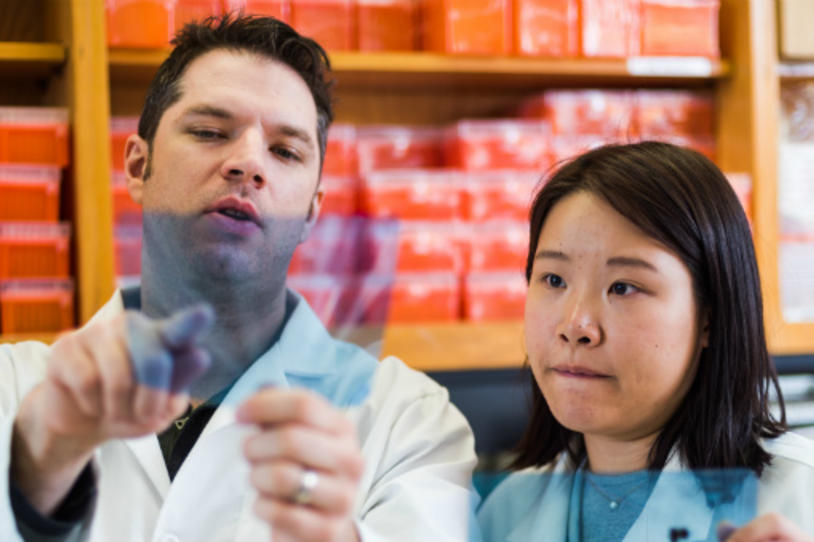
The Michael J. Fox Foundation for Parkinson's Research (MJFF) announces 39 new grant awards totaling more than $5 million. The selected projects reflect our research strategy to define, measure and treat Parkinson's disease. We also awarded grants to help develop the research tools the field needs to advance.
All of our funding decisions serve our mission to find a cure for Parkinson's and improved treatments for those living with the disease today. Each research step -- from laboratory studies to understand the disease through clinical trials of potential drugs to stop it -- is designed to support those goals. Highlights of the studies that received our latest grants follow. For more information on recent MJFF-supported projects, visit our funded grants page.
Define
We seek to understand the causes of Parkinson's, its progression and the factors that account for the variability of the disease. We recently issued six new grants in this area at a total of $1,535,131.
- Two projects are investigating the GBA gene. Mutations in this gene are linked to Parkinson's disease. Bahareh Behrouz, PhD, at biotech company NeuroInitiative LLC is using computers to simulate how GBA and another Parkinson's-associated gene, LRRK2, may interact. Her team also will test if therapeutic strategies against these targets may work in people without these mutations. Avner Thaler, MD, PhD, at Tel Aviv Sourasky Medical Center is looking at inflammation in people with a GBA mutation, those with Parkinson's and at-risk mutation carriers. Higher inflammation levels in these populations could lead to therapies to ease symptoms and perhaps even prevent disease onset.
- Other projects are looking at another priority target: the alpha-synuclein protein. Nearly everyone with Parkinson's has clumps of alpha-synuclein, which scientists believe is toxic to cells. Robert H. Edwards, MD, at the University of California, San Francisco will examine how rare genetic mutations change the function of alpha-synuclein. That understanding could help direct treatments to correct or offset that dysfunction, including in people without those mutations.
Measure
MJFF funds the discovery of methods to diagnose Parkinson's, measure its progression and assess the effectiveness of treatments for it. We recently supported 19 new projects in this area with a total of $2,119,440.
- Two grants are supporting projects using imaging techniques to measure Parkinson's disease. Robert Mach, PhD, at the University of Pennsylvania is developing an imaging agent to visualize the Parkinson's-implicated protein alpha-synuclein in the living brain. We also have issued a supplemental grant to Neil Vasdev, PhD, at MedChem Imaging LLC for his work testing imaging tools to measure synapses, structures in the brain that allow nerve cells to communicate with other cells.
- Yuanfang Guan, PhD, at the University of Michigan will apply and develop deep learning models to interpret data collected from wearable devices. Deep learning teaches computers to recognize and classify items. It's how Apple's Siri or Amazon's Alexa can recognize and respond to your words, for example. These models could help measure movement and disease progression with smartphones and smartwatches.
- Another funded project is pursuing a Parkinson's measure in urine, a sample easy to obtain frequently and over time (as compared to spinal fluid, for example). Kendall Van Keuren-Jensen, PhD, from the Translational Genomics Research Institute is measuring and analyzing RNA, our gene's messengers, in urine from control volunteers, people with Parkinson's and people with Alzheimer's disease. Finding Parkinson's-specific RNA changes in urine could lead to an easily accessible test for Parkinson's and more information on the effect of the disease.
Treat
These awards directly fund the development of treatments to slow or stop Parkinson's and alleviate its symptoms. We recently gave two new grants in this area at a total of $514,506.
- Jennifer A. Johnston, PhD, at biotechnology company An2H Discovery is testing activators of the parkin pathway. The protein parkin plays a role in keeping dopamine cells healthy, but some people with Parkinson's have lowered parkin function. Correcting that issue may help protect brain cells and slow or stop disease progression.
- Mary Maral Mouradian, MD, at Robert Wood Johnson Medical School is screening compounds for impact on alpha-synuclein aggregation. Her team has shown that the protein transglutaminase 2 (TG2) may play a role in alpha-synuclein clumping and is now working to identify and test TG2 inhibitor compounds.
Tools
We ensure the field has the research tools it needs to advance, such as assays, cells lines, and DNA plasmids. We recently supported 12 new projects in this area with a total of $1,286,187.
- This round of grants supported a number of projects developing research tools around key Parkinson's targets such as alpha-synuclein and inflammation.
- It also included support for Fox BioNet, a consortium of centers mobilized to quickly collect biological samples for studies that aim to measure specific proteins and pathways implicated in Parkinson's disease.
